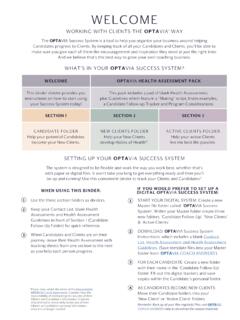Transcription of Practical Money Skills Workbook
1 Practical Money Skills WorkbookSmart Tips for Better Money ManagementPractical Money Skills Workbook 1 Budgeting Basics 2 Mastering Your Money 2 Making a Plan 5 Monthly Expense Tracker 6 Balancing Your Budget 8 Online and Mobile Banking 10 Your Money and Online Banking 10 Cashless Payments 12 Checking Account 14 Getting Started: Banking Options 14 Good Record-Keeping 17 Debit Cards 18 Debit Versus Credit: What s the Difference? 18 Things to Remember 19 Savings Account 20 Saving for a Rainy Day 20 Savings Worksheet 21 Understanding Credit 22 What is a Credit Score?
2 22 How to Improve Your Score 24 Credit Cards Know Your Limit 25 Take Care with Credit 28 Test Yourself 32 Glossary of Terms 34 Online Resources Back Cover Whether you are just starting out on your own or you ve been managing your own Money for years, basic budgeting, saving and credit Skills can help you gain control over your financial future. This Workbook is designed to help you learn basic budgeting Skills and understand how financial services and products work so you can manage your Money with earlier you start using good Money management practices, the easier it will be to stick with them and the more positive impact you ll have on your financial future.
3 This Workbook provides an opportunity to become better at managing your Money starting today, so you can enjoy life, free of undue financial 's why Visa has put together this program. We want you to understand the basics of managing Money wisely. Our hope is that after you complete this Workbook , you'll have a better understanding of living within a budget, the nuances of banking and how to handle credit responsibly Skills that can help you create a more secure financial of ContentsGetting StartedMastering Your MoneyIn order to manage your Money , you need to have a plan.
4 That is why creating a budget, and sticking to it, is a critical foundation for financial order and stability. By tracking your income and expenses, you will be better able to distinguish between needs and wants and ensure that you re living within your Your IncomeThe first step in this process is to know how much you make, including your salary, wages and tips. Figure out how much you have coming in each month and use the chart below to track your monthly income. Make sure to include only income you can count on no gifts or Your ExpensesTracking your expenses is another key step toward financial responsibility.
5 To begin, get receipts or take note of everything you spend over the month and record it weekly in the Budgeting Worksheet on page 9. Many people are surprised how unplanned purchases can add up. By making a habit of tracking your expenses, you can see where your Money is going, curb unnecessary spending and increase your Practical Money Skills WorkbookBudgeting BasicsTip: You can track your expenses using personal finance budgeting apps, which make budgeting more convenient than Money Skills Workbook 3 Six Saving IdeasIf you find you are spending more than you make, now is the time to start spending less and setting aside more.
6 Here are a few of the many ways you can save. > Pay yourself first: Determine a set amount of Money to put away every month and treat it like any other bill. Put away part of every paycheck ideally at least 10-15% and watch your savings grow. > Save on food: Plan out the week's meals with your budget in mind. Try making dishes that rely on the same staples to save on your grocery bill. Just make sure to mix things up so you won t get bored; this could make you more likely to splurge on eating out. > Reconsider coffee: That daily coffee run could be costing you over $850 per year, not including tip.
7 Cutting back on these small daily expenses or purchasing an inexpensive coffee maker could help you save in the long run. > Save your windfalls: Did you receive an unexpected bonus at work, an inheritance or a tax refund? Instead of depositing the Money into your checking account where you may be likely to spend it, put some or all of it into your savings account for safe keeping. > Visit your local library: Save Money by borrowing books from your library instead of buying them. Most libraries have e-books and movies you can stream online so you don t even have to leave home to enjoy them.
8 > Weatherproof your home: Visit your local hardware store to buy supplies to fix drafty windows that may be letting warm air out in the winter and cool air out in the summer, a factor that could be impacting your utilities bill. > Share living expenses. Living with a roommate is a great way to cut monthly costs in half. > Get the best rates. Compare costs from different insurance companies to ensure you re getting the best rate. > Plan for big expenses. Try to put Money aside when you know big expenses, like holiday gifts, a car repair or a family trip, are coming up.
9 > Use credit wisely. Carefully consider how quickly you can pay off purchases before using credit, as high monthly payments can take a toll on your AmountActual AmountIncome #1 Income #2 Other IncomeTotalTotal Income4 Practical Money Skills WorkbookBudgeting BasicsMaking a PlanTrack your expenses for a month with the worksheet on pages 6 and 7. Look at all of your expenses by category, estimate your monthly income, see what you ve spent and make a spending plan for the coming month. Tracking your expenses will allow you to compare your discretionary purchases (items you want) to non-discretionary purchases (items you need) so you can cut back on unnecessary spending and increase your savings.
10 (See example on the opposite page.)Make sure to balance your budget every month to ensure you re not spending more than you re making. If you find you re spending too much on discretionary purchases like entertainment or clothes, you can cut back the next month. Keep in mind that non-discretionary expenses, like housing and utility bills, will take a little more planning to reduce. If you find the process difficult at first, don t worry. A personal budget is a work in progress, and spending within your budget will soon become second to Meet Your Goals > Prioritize your savings goals.






